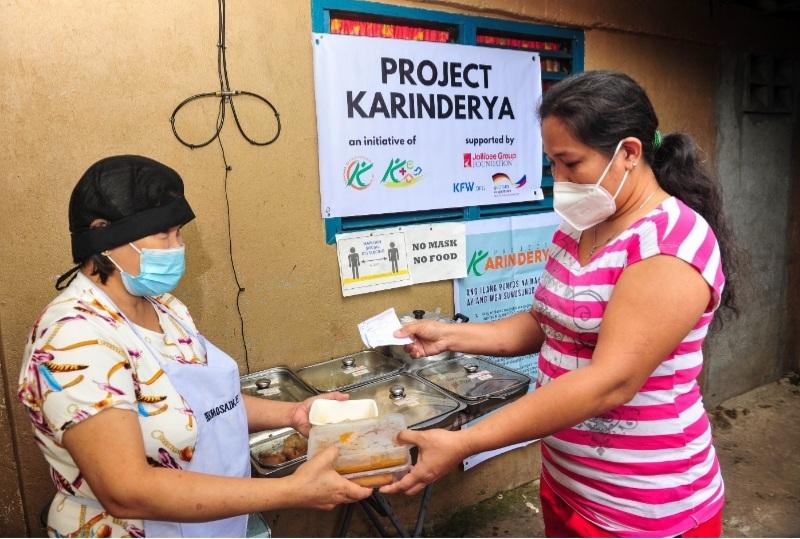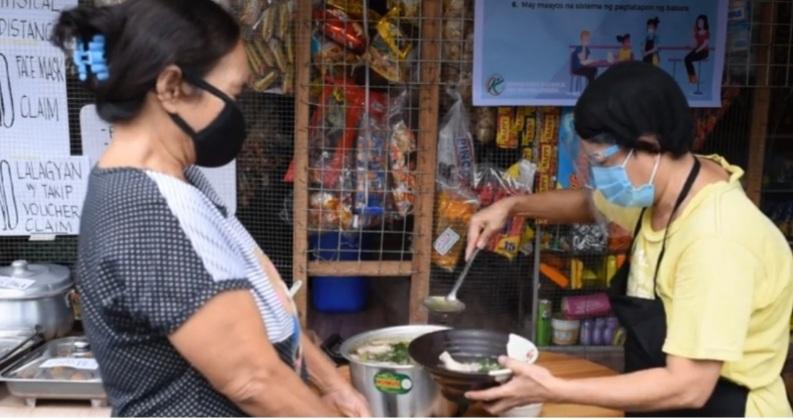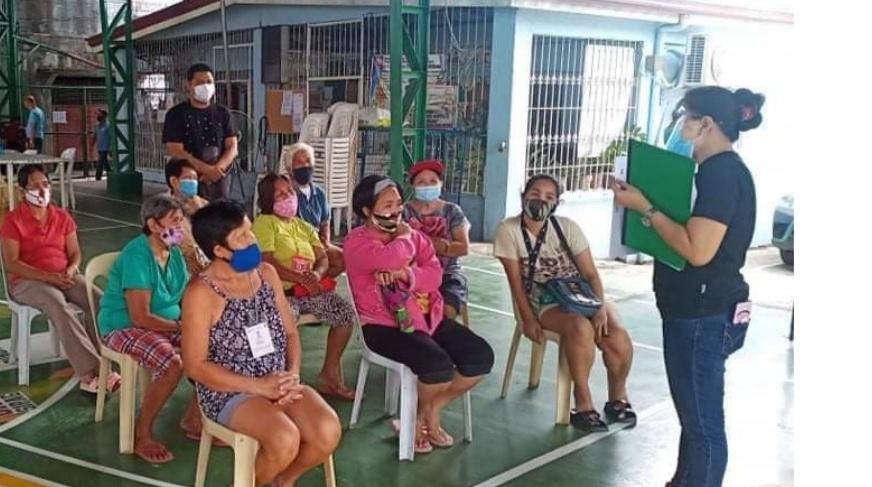
Helping Address Hunger.Through Project Karinderya, civil society and private sector organizations banded together to make food immediately available to an increasing number of families who suffer hunger because of the lockdown, while helping karinderyasto survive and recover their source of income.
Agnes Gabatbat makes a living as a cook. For the past six years, she has run a karinderya in Batasan, Quezon City. Because of the pandemic, her husband lost his work, and the family of 12 had to rely on Agnes and her karinderya for their daily needs.
“’Yung mgaanak ko patuloyna nag-aaralkahit pandemic kaya patuloy din akosapaghahanap-buhay. Nagtulungan kami ng mister ko sakarinderya (Despite the pandemic, my children must finish their schooling, which is why I must continue to work. At the karinderya, my husband and I worked together),” she stated.
Many small companies, like Agnes’, were severely affected by the COVID-19 pandemic. Agnes used to make roughly Php 6,000 to 7,000 a day, but her sales were halved as a result of the pandemic’s rigorous quarantine rules and financial hardships, and she eventually lost some of her customers.

Helping Revive Livelihood. AgnesGabatbat, one of the karinderya owners that have benefitted from Project Karinderya, serves a customer in Batasan, Quezon City. Project Karinderya helps karinderya owners like Agnes to revive their small businesses after the financial challenges they suffered from COVID-19 pandemic.Project Karinderya helped revive Agnes’ livelihood. “Gumanda po ang kitadahildumami ang customers. Yung regular benta ko na Php 4,000 ngayong pandemic, nadagdagan ng isanglibo (My sales improved because the customers are increasing. There is also a thousand increase on my Php 4,000 regular sales during this pandemic),” she said.
Reviving livelihoods
To help small business owners like Agnes weather the effects of the global health crisis, Jollibee Group Foundation (JGF) has partnered with Kasagana-Ka Development Center (KDCI) and KabuhayansaGanapnaKasarinlan Credit and Savings Cooperative (KCoop) to assist and re-establish the operations of karinderyas from low-income communities in NCR, Bulacan, Cavite, and Rizal.Every karinderyathat is that is part of the program serves meals to 20 families in their community for a period of 30 days.
JGF, KDCI, and K-Coop are all part of the COVID-19 Civil Society Sector Organizations & Private Sector Coalition (or NGO Collab), a group of civil society and private sector organizations that have banded together to address the effects of the COVID-19 pandemic on varying issues in the Philippines.
“Sinabihan po ako ng Kasagana-Ka tungkolsa Project Karinderya. Ako po ay nagpapasalamatdahilnapabilangakosaproyektongito. Hindi po biro namakasalidito kaya malakingbiyaya po itosa akin(Kasagana-Ka told me about Project Karinderya. I’m very grateful to be included in this project, and this is a huge blessing for me),” said Agnes.
Singapore-based Temasek Foundation and the German Federal Ministry for Economic Cooperation and Development (BMZ) through the DEG (German Investment Corporation) also recognized the impact of the project and provided grants for the meal subsidy of family beneficiaries.

Helping Ensure Food Safety and Quality.To help karinderya owners recover from the effects of the pandemic, as well as keep their sustainable even after the program, the Jollibee Group Foundation provided t with trainings on food preparation, food safety, and customer service.
Food Safety Training
JGF provided karinderya owners with trainings on food preparation, food safety, and customer service.“All livelihood programs that we undertake in Jollibee Group Foundation are aimedat addressing the felt-need in communities and empoweringbeneficiaries so that they become self-sustaining. We have the same goal for Project Karinderya—we aim to helpkarinderyaowners upskill themselves and develop the right mindset of persevering amid this pandemic,” said Jollibee Group Foundation Executive Director Gisela Tiongson.
Under the program, karinderya owners and their personnel were also required to wear face masks, face shields, hairnets, and aprons for safety. Karinderyas also used plastic coverings for the dishes and posted a daily menu to help customers choose their preferred food faster and to prevent overcrowding.
To ensure that the protocols and practices shared with the karinderya owners were being practiced, Health Cadet volunteers of KDCI visited karinderyas weekly during the project’s implementation to monitor the karinderyas’ compliance to the project guidelines.
“Ngayon pa lang po akonaka-attend ng ganoongseminar. Malakingbagay po itosa akin dahilmarami po akongnatutunandito. Importante po namalinis ang mgapagkain. Kailangan din natingsumunodsamga protocol tulad ng social distancing(It was my first time attending this kind of seminar and I learned a lot from it, like the importance of food safety and following safety protocols like social distancing),” shared Agnes.
Financial help for families in need
Just like Agnes, Lilia Albario was struggling to make ends meet because her children also lost their jobs during the pandemic. She and her grandchildren are making doormats to earn. But like everyone else, the pandemic made it hard for them to sell and continue with the business. “Wala po kamingmasakyan. Naglalakad pa po kami ng malayo para makaratingsapalengke at makapagtinda(There was no available transportation. We even walk long miles so we could go the market and sell),” she shared.
Through Project Karinderya, financial subsidy in the form of vouchers were given to vulnerable families like Lilia’s.Beneficiaries were given vouchers for 30 days, which they used to claim food from the participating karinderya in their area.
KDCI, K-Coop, and JGF targeted pregnant and lactating women, families with five children under the age of 15, and families with senior people and/or impairments in order to reach the most deserving families. “We were systematic in choosing the families who would be part of the project because wanted the project to be effective in targeting those most in need of help in the communities,” said K-Coop General Manager Maria Ana de Rosas-Ignacio.
“Kaya malakingtulong po sa amin ‘yung Project Karinderyakasi ‘yungnaibibigaynilana pang-ulamnaminaraw-araw ay hindina po nanggagalingsaamingbulsa (Project Karinderya is extremely beneficial because the food we receive every day does not come from our own money),” Lilia said, the cuisine offered is nutritious, with a combination of veggies and meat.
Through 230 karinderyas across Metro Manila and nearby regions, the collaboration has provided 30-day meal subsidies in the form of meal vouchers to 4,600 families as of February 2021. Those interested in supporting or replicating the project may contact the NGO Collab secretariat at [email protected].

No Comments